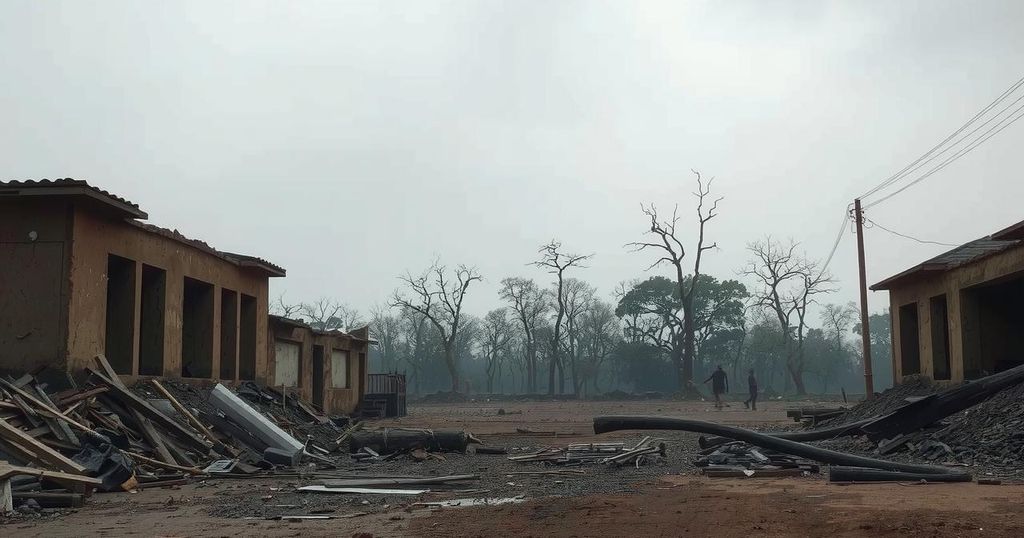World news
ADF, AFRICA, AFRICA CENTER FOR STRATEGIC STUDIES, AL JAZEERA, ALLIED DEMOCRATIC FORCES, BUKAVU, CIVIL WAR, CODECO, CONGO, CONGO (KINSHASA), COOPERATIVE FOR THE DEVELOPMENT OF CONGO, DEMOCRATIC REPUBLIC OF THE CONGO, DISPLACEMENT, DR CONGO, DRC, GOMA, HUMANITARIAN, HUMANITARIAN CRISIS, ITURI, KINSHASA, KIVU, M23, NORTH, PAUL NANTUL, PAUL NANTULYA, RWANDA, SEXUAL VIOLENCE, SOUTH KIVU, UGANDA, UK, UNITED NATIONS, WALIKALE, WAR
Fatima Alavi
0 Comments
DRC Conflict Reignites Dark Memories of the Congo Wars
The DRC is witnessing a resurgence of conflict as M23 rebels advance towards Kinshasa, prompting concerns over regional stability. The involvement of Rwandan and Ugandan troops has raised fears of a looming larger conflict, echoing the past Congo wars. With significant humanitarian challenges and resource exploitation at play, analysts urge immediate political negotiations and attention to the well-being of Congolese citizens.
The ongoing conflict in the Democratic Republic of the Congo (DRC) is becoming increasingly dire as M23 rebels advance towards Kinshasa, raising alarms and prompting communities to either prepare for conflict or flee. The situation has become more critical with the M23 capturing key cities such as Goma and Bukavu, leaving a trail of destruction. Despite Kinshasa’s $5 million reward for capturing M23 leaders, the rebels continue their operations unchecked, drawing international concern.
The presence of Rwandan and Ugandan troops is escalating in the DRC, where fighting has persisted since January, resulting in nearly 7,000 fatalities, according to reports. Uganda has ramped up troop deployments to combat local armed groups, while political analysts warn this may echo the violent history of the Congo wars, suggesting the potential for a larger regional conflict if the situation is not managed effectively.
The conflict has roots tracing back over three decades, characterized by complex grievances involving ethnic tensions, resource exploitation, and regional power plays. Rwanda’s interventions in the DRC have historically revolved around pursuits against Hutu rebels. The turbulent history of the First and Second Congo Wars resulted in a humanitarian crisis that left millions dead and resources looted, with foreign nations backing various factions.
Since the wars, violence has not abated; numerous armed groups, including M23, have emerged, perpetuating a cycle of death and displacement. Current reports indicate ongoing illegal mining and exploitation of the DRC’s rich mineral resources, which remains a significant factor in perpetuating conflict in the region. The United Nations and various organizations have called for action to address human rights abuses and strengthen the legitimacy of the Congolese government, which faces multiple challenges, including corruption.
Today, regional dynamics reflect ongoing conflicts and interventions aimed at securing strategic interests. M23’s control over resource-rich territories raises concerns about the financing of their military operations through illegal resource trading. Political analysts indicate that peace talks and negotiations among African nations are necessary to bring about stability.
The DRC faces a heavy burden, with calls for a comprehensive dialogue to address both internal challenges and external pressures. Analysts stress the importance of prioritizing the welfare of the Congolese people in any resolution efforts. “We’re saying that the people of the Congo have to be alive so that they can rebuild the country for the benefit of the African continent. That’s why DRC needs a break. Not just for themselves, but for the entire African continent,” emphasized analyst Kambale Musavuli.
The resurgence of conflict in the DRC amid M23 rebel advances highlights a troubling continuation of its violent history, marked by foreign intervention and regional instability. With the risk of a broader regional conflict looming, a multi-faceted approach involving political negotiation, reinvigoration of Congolese governance, and international cooperation is essential for achieving lasting peace. The urgent need for a focus on the lives of Congolese citizens remains paramount in addressing both historical grievances and current crises, underscoring the region’s interconnected challenges.
Original Source: www.aljazeera.com




Post Comment